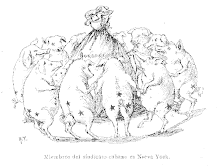I’ll admit upfront that I’ve been guilty in the past of misusing common expressions (even the few I've identified here in this post). But, even at the risk of sounding hypocritical, it’s worth at least one post to draw a little attention to these common mistakes. I hear some of these errors almost every day from intelligent, articulate people (some of which have their own TV shows for god’s sake). And, since I was pretty tough on some Korean’s English in the last post, it’s only fair that I call us native speakers out too.
Data—Data is plural. The singular form is Datum. Don’t say “the data is conclusive.” Say “the
data are conclusive.” And please, unless you want to get a foot up your ass for being a pompous
prick, don't ever say datum.
data are conclusive.” And please, unless you want to get a foot up your ass for being a pompous
prick, don't ever say datum.
Sacred cow—People can’t be sacred cows, ideas are. People, however, can most
certainly be "fat cows," "stubborn cows," or just "cows." Certain restrictions occasionally apply.
certainly be "fat cows," "stubborn cows," or just "cows." Certain restrictions occasionally apply.
Immaculate Conception—I don’t know why people just don’t look this
up before they say it. But the “immaculate conception” is not the conception of Jesus. The
“immaculate conception” refers to Mary’s conception. According to the book of Luke (hence, ". . .
Mary, full of grace . . ."), Mary was conceived without original sin. Regardless of how people feel
about religion, let’s get the goddamn usage right!!
up before they say it. But the “immaculate conception” is not the conception of Jesus. The
“immaculate conception” refers to Mary’s conception. According to the book of Luke (hence, ". . .
Mary, full of grace . . ."), Mary was conceived without original sin. Regardless of how people feel
about religion, let’s get the goddamn usage right!!
These are just a few I came up with off the top of my head.
Any other ideas? Let me know.









In the intro paragraph you refer to "articulate people" and then in parenthesis you use the relative pronoun 'which' to refer to those people. I think you should use 'whom' to refer to people. Which generally refers to things, who or whom to people. So it would be ...articulate people (some of whom...).
ReplyDeleteGood call! You're absolutely right, Phillip. I wasn't lying when I called myself a hypocrite.
ReplyDeleteBut, the post was meant to be a joke (hence "goddamn," "stubborn cows," etc . . .)—a little William Strunk with a dash of Ambrose Bierce. From your serious tone, it doesn't seem it went over well with you. I'll try harder next time. Thanks for the encouragement.
I get the joke and don't mean to be douchy, I was just pointing out the grammar mistake, my tone was meant to be neutral. I know your post was more about errors in usage and not grammar. Not a big deal. It just goes to show what a tough language English is, even for us native speakers.
ReplyDeleteNot douchy at all. Thanks for the comment.
ReplyDelete